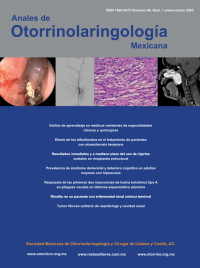
Learning styles in medical residents of clinical and surgical specialties.
An Orl Mex. 2023; 68 (1): 1-6. https://doi.org/10.24245/aorl.v68i1.7843
Gabriel Mauricio Morales-Cadena,1 Valeria Lagunes-Costales2
1 Hospital Español de México. Jefe del curso de posgrado de otorrinolaringología y cirugía de cabeza y cuello.
2 Médico residente de otorrinolaringología y cirugía de cabeza y cuello.
Facultad Mexicana de Medicina, Universidad La Salle, México.
Resumen
OBJETIVO: Determinar si existen diferencias en los estilos de aprendizaje entre diversos años de residencia y entre especialidades quirúrgicas o clínicas a nivel posgrado, además de conocer si dichos estilos tienen variación según el sexo.
MATERIALES Y MÉTODOS: Estudio descriptivo, transversal, realizado de abril a octubre de 2021. El instrumento utilizado fue el cuestionario de estilos de aprendizaje CHAEA validado por Alonso que consta de 80 ítems, en el que 20 preguntas distribuidas de manera aleatoria corresponden a cada estilo de aprendizaje. Para la estadística descriptiva se usaron medidas de tendencia central. En la estadística inferencial se usó la prueba de un factor de ANOVA, se consideraron significativas diferencias con un valor de p ≤ 0.05
RESULTADOS: Se aplicó el cuestionario a 50 residentes, que se distribuyeron por sexo, por especialidad quirúrgica y clínica y por año de residencia. Encontramos una tendencia al estilo de aprendizaje reflexivo en todas las muestras analizadas, aunque no fue estadísticamente significativo.
CONCLUSIONES: Esta investigación se realizó durante la pandemia de SARS-CoV-2; los resultados variaron de acuerdo con lo reportado en la bibliografía, lo que significa que los estilos de aprendizaje pueden ser flexibles y adaptativos.
PALABRAS CLAVE: Aprendizaje; cuestionario; residencias médicas.
Abstract
OBJECTIVE: To determine if there are differences in learning styles between various years of residency and between surgical or clinical specialties at the postgraduate level, as well as to know if these styles vary depending on gender.
MATERIALS AND METHODS: A descriptive, cross-sectional study. The instrument used was the CHAEA learning styles questionnaire validated by Alonso, which consists of 80 items, in which 20 randomly distributed questions correspond to each learning style. For descriptive statistics, measures of central tendency were used. In the inferential statistics, the ANOVA one-factor test was used, significant differences were considered with a value of p ≤ 0.05.
RESULTS: The questionnaire was applied to 50 residents, distributed by sex, by surgical and clinical specialty and by year of residence. We found a tendency towards a reflective learning style in all the samples analyzed, although it is not statistically significant.
CONCLUSIONS: This research was carried out during the SARS-CoV-2 pandemic, the results varied according to what is reported in the literature, which means that learning styles can be flexible and adaptive.
KEYWORDS: Learning; Questionnaire; Medical residencies.
Recibido: 13 de junio de 2022
Aceptado: 2 de enero de 2023
Este artículo debe citarse como: Morales-Cadena GM, Lagunes-Costales V. Estilos de aprendizaje en médicos residentes de especialidades clínicas y quirúrgicas. An Orl Mex 2023; 68 (1): 1-6.

